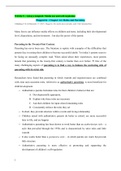WEEK 5 – Always tempted: Media use and self-regulation
Plugged In – Chapter 14: Media and Parenting
Valkenburg, P. M., & Piotrowski, J. T. (2017). Plugged in: How media attract and affect youth. Yale University Press.
Many forces can influence media effects on children and teens, including their developmental
level, dispositions, and environment – but also the power of the parent.
Parenting in the Twenty-First Century
Parenting has never been easy. The literature is replete with examples of the difficulties that
parents face in raising their children to become successful adults. Yet today’s parents seem to
be facing an unusually complex road. When asked about their experiences, most parents
lament that parenting in the twenty-first century is harder than ever before One of the
many challenging aspects of parenting is to find a way to balance the nurturing side of
parenting with its strict side
Researchers have found that parenting in which warmth and responsiveness are combined
with clear and consistent rules, referred to as authoritative parenting, is most beneficial for
child development
Authoritative parents formulate rules for their children’s behavior that are:
A. Developmentally appropriat,
B. Explain why these rules are necessary
C. Ask their children for input when formulating rules
D. Consistently enforce the rules they set
In short, they provide structure within a warm and loving relationship
Children raised with authoritative parents do better in school, are more successful
later in life, and are happier
Authoritative parenting has been shown to work better than an authoritarian style – a
style that prevailed through the 1950s and is characterized by strict rules and little
warmth
It also works better than a permissive style – in which parents are warm but provide
little structure
Authoritative parenting is more effective at promoting and supporting the
development of children’s self-regulation
1
,Particularly, self-regulation reflects the ability to resist impulses and temptations that
keep us from achieving our long-term goals
It implies, for example, that we limit our intake of junk food and alcohol so that we
can stay healthy
that we resist taking a swipe at a boss or a loved one if they make an annoying
remark; and that we turn the smartphone to silent or off when we need to finish
homework or other tasks
Self-regulation is one of the most important predictors of success in life
People who struggle with self-regulation are, compared with successful self-
regulators, at a greater risk of succumbing to behaviors that lead to problems such as:
1. Obesity
2. Substance abuse
3. Spiraling debt
4. Unwanted pregnancy
The mission of authoritative parents is to help children slowly but surely accept and
internalize the rules and requirements of their environment and society at large. This
internalization is best achieved when parents communicate rules and requirements in a way
that promotes the child’s autonomy gradually teaching their children how to regulate
their behavior autonomously and voluntarily
Children’s initial compliance comes from an extrinsic motivation, that is, either to avoid
punishment or to please their parents but when parents raise their children
authoritatively, children’s extrinsic motivations will likely turn into intrinsic ones
Setting boundaries does not mean being harsh
Discussions of authoritative parenting often raise the question of how to set boundaries.
Authoritative parenting requires considerable self-regulation from parents They must
be able, and want, to see things from the child’s perspective, keep their emotions under
control, and be patient and tolerant with their child’s behavior rather than indifferent, angry,
or pushy.
Some parents, especially those with a higher education, find it a challenge to set and
enforce rules because they wrongly associate rules with harshness and a lack of
warmth
2
, Other parents may feel too busy or too tired to enforce the rules they set
Others may find it difficult to discipline their children in public because they feel they
are being watched and are afraid that others will think they are bad parents
Inconsistent enforcement takes several forms:
A. Parents may give into a temper tantrum at the supermarket if the child kicks and
screams long and loudly enough
B. Parents may be unwilling to punish their child at the moment she or he misbehaves,
because they are too tired or have visitors, but plan to punish the child more severely
the next time
These forms of inconsistent enforcement can have negative outcomes, including increased
conflict in the family and problem behaviors in children. Inconsistent parenting stimulates
resistance and recalcitrance in children, a phenomenon known as psychological reactance
Psychological reactance interferes with the internalization of rules and requirements and, as a
result, with the development of children’s self-regulatory skills
Media management in the family
The most difficult limits for parents to enforce are rules about media use, particularly
teens’ media use. Restricting media use, especially for teens, is a challenge for many parents
because restriction can easily lead to boomerang effects.
According to Judith Smetana, the effectiveness of parental discipline seems to depend
strongly on the degree to which children consider their parents’ authority legitimate. In
her social domain theory, she distinguishes between three domains of parenting:
1. The moral
* This domain deals with problems such as lying and stealing
* Most children and teens find parental interference in this domain legitimate: it
is never okay to lie or steal, not even if it goes unnoticed
* Parents are “allowed” to punish if they discover transgressions within this
domain.
2. The conventional
3





